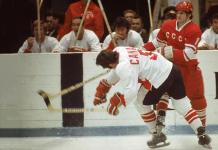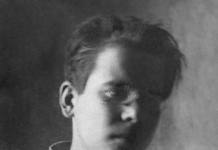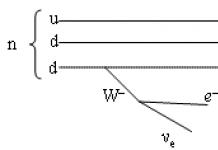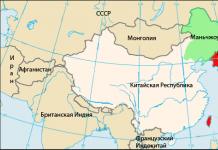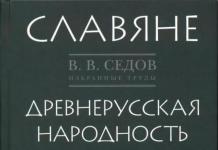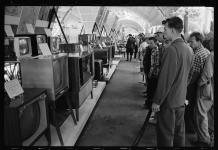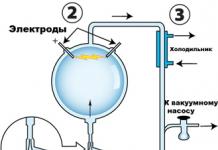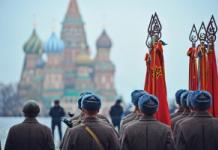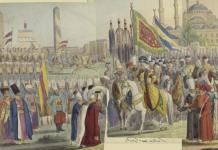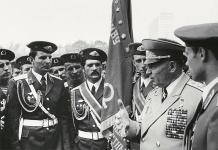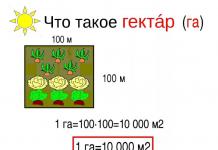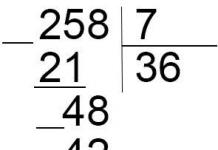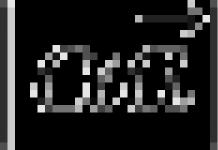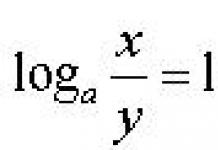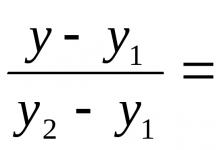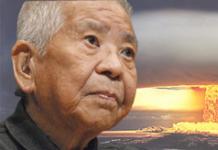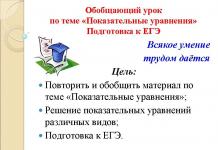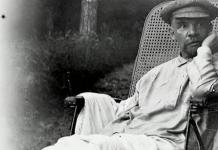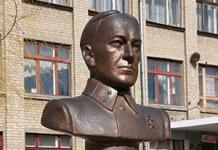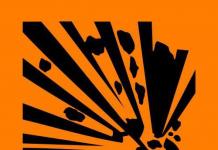The final game of the 1997 Summer Series.
Participants
A team of experts
- Inna Druz (rating - 11,300,000)
- Alexander Druz (rating - 11,000,000)
- Mikhail Jabbarov (rating - 11,000,000)
- Georgy Zharkov (rating - 10,000,000)
- Andrey Kozlov (rating - 8,800,000)
- Boris Burda
Round 1 (Veronika Ananicheva, Engels)
"Holy cabby"
Attention, "Holy cabby"!
What pleasantly surprised Marc Chagall when he saw this painting of his at the Berlin Exhibition in 1914?
Boris Burda answers: He was surprised that the picture was hung correctly. Correct answer: The picture was hung incorrectly, and in this form Chagall saw the picture more lively and dynamic Check - 0: 1 ... Boris Burda - rating 0.
Round 2 ("Super Blitz")

This is how the cap is worn during the parade

And so - during preparation
Not a single bet played out. At stake - 2,500,000 rubles. Alexander Druz remains at the table.
Question 1(Evgeny Alekseev, Mariupol). How do some soldiers wear their caps during the parade, and how - during the preparation for the parade?
Alexander Druz answers: During the parade - traditionally; during preparation for the parade - back Correct answer: During the parade - traditionally; during preparation for the parade - upside down and should not fly off during the parade in order to educate his gait Check - 0: 2 ... Alexander Druz - rating 0.
Round 3 (Alevtina Sarycheva, Tula region)
“Behold, you are the ones who bicker about what you have knowledge of; why do you argue about what you have no knowledge about? You will be tested both in your possessions and in yourself, and I will judge between you. " These are the words from the third chapter. What is the name of the first chapter that opens the book?
Boris Burda answers: Opener (Al-Fatiha) The answer is correct. Check - 1: 2 ... Boris Burda - rating 5,000,000.
Round 4 (Larisa Rozhdestvenskaya)

Part of the human body
Not a single bet played out. At stake - 1,500,000 rubles.
Attention, part of the human body!
Where exactly, in what place of the Czech city of Litomyšl in the 16th century. was this part of the human body embedded in the wall?
Andrey Kozlov answers: The hand was embedded in the wall of a temple or almshouse as a sign of alms, mercy Correct answer: This part of the body - the elbow - was embedded in the wall in the marketplace as a standard of length when selling and buying goods. Check - 1: 3 ... Andrey Kozlov - rating 0.
Round 5 (Tatiana Radyakina, Yuzhny settlement, Rostov region)

Weapon of the proletariat
Andrey Kozlov plays. At stake - 15,000,000 rubles.
Attention, weapon of the proletariat!
It turns out that the cobblestones were used not only by the proletariat, but also by some Saka horsemen to improve their skills. How did they do it?
Andrey Kozlov answers: They sat on this cobblestone Correct answer: They pinched him between his legs and jumped Check - 1: 4 .
Round 6 ("Blitz")
Not a single bet played out. At stake - 3,000,000 rubles.
Question 1(Stanislav Korenblit, Moscow). Read by heart the poem about the 47th element of the first book of Euclid's Elements.
Boris Burda answers: Pythagorean pants are equal in all directions The answer is correct.
Question 2(Igor Sitkovsky, Moscow). "Teacher," - they once asked the same Euclid, - "what would you choose - one whole apple or two halves equal to this whole?" What did Euclid choose and how did he explain his choice?
Mikail Jabbarov answers: Euclid chose the whole, because it is always easier to make two halves of a whole, and it is much more difficult to make a whole out of two halves. Correct answer: Euclid chose two halves, because if he chose a whole apple, then how would he know if it is wormy or not. Check - 1: 5 .
Round 7 (Olga Lipich, Penza)
Andrey Kozlov plays. At stake is RUB 25,000,000.
At this time of year, television, Kabuki theater, and other theaters in Japan specifically include scary plays in their repertoire. The Japanese themselves also tell each other scary stories of ghosts and ghosts at this time of year. What time of year does all this happen and why?
Andrey Kozlov answers: In the summer, because the Japanese start to grow cold with horror The answer is correct. Check - 2: 5 ... Andrey Kozlov - rating 25,000,000.
Round 8 (Sergey Karpov, Astrakhan)
Played by Boris Burda. At stake - 20,000,000 rubles.
"Many, blowing the air out of themselves with great impetuosity, will lose their sight, and soon all other senses." Who are these "many" and what is happening in general?
Boris Burda answers ahead of schedule: You need to blow out the candle and first you will lose your sight, and during sleep all other feelings are lost. The answer is correct. Check - 3: 5 ... Boris Burda - rating 25,000,000.
Round 9 (Andrey Nefedov, Tula)

Mark Bernes, who sang the song "Scows Full of Mullets"

In the black box - granulated sugar
Inna Druz plays. At stake - 15,000,000 rubles.
Attention, black box!
"... for the wedding, the movers put on their shoes with a terrible creak." In the black box - the reason for this creak. What's in there?
Inna Druz answers: Granulated sugar The answer is correct. Check - 4: 5 ... Inna Druz - rating 15,000,000.
Round 10 (Alexander Kostyukov, Rostov-on-Don)
Played by Boris Burda. At stake - 5,000,000 rubles.
Before him, in the sad gloom,
The crystal coffin is swinging
And in a crystal coffin that
The princess sleeps in eternal sleep.
Boris Burda answers: "And oh, the dear bride's coffin / He hit with all his might / The coffin crashed. The Virgin suddenly / Revived The answer is correct. Check - 5: 5 ... Boris Burda - rating 30,000,000.
Round 11 (Igor Filippov, USH 349/56)
Played by Alexander Druz. At stake - 15,000,000 rubles.
"Whoever conquers pain and fear will become God himself." By this thought, this writer is close to Mr. Filippov. And how is this writer close to connoisseurs?
Alexander Druz answers: Dostoevsky The answer is correct. Check - 6: 5 ... Alexander Druz - rating 15,000,000.
Alexandra Marinina, using her right, adds a point to the viewers' score.
Check - 6: 6
Round 12 ("Zero")

According to Druz, for the implementation of the project in this saucer, the necessary funds were collected from each
Mikail Jabbarov is playing. At stake - 10,000,000 rubles.
Let's assume that this saucer is not mine, but Muravyov-Apostol. Remember there was such a dreamer, a Decembrist, a dreamer? So, Muravyov-Apostol came up with a wonderful project at one time. Some great action was to take place on this project, and this project was to be achieved in a simple, easy and understandable way. Unfortunately, the project did not take place. You have a chance to implement the Muravyov-Apostol project. Make a great action that Muravyov-Apostle failed and tell me why he brought this saucer with him?
Mikail Jabbarov gives the right to answer to Alexander Druz: In this saucer, funds were collected from everyone in a circle in order to carry out a humane project Correct answer: Muravyov-Apostol wanted this saucer to be in every gambling house in Russia, and from each win the chip had to be put in the saucer. The collected funds were sent to charity. Check - 6: 7 ... Due to the fact that the location of the planned project was not named, the answer was not taken into account.
Results of the game
- The team of experts is defeated.
- For the first time since 1989, the game score exceeded 6 points.
- On the last question, a conflict arose between the presenter and the experts. In the course of long attempts, Alexander Druz manages to give the correct answer, but the presenter does not count it and asks to clarify exactly where the funds were collected. In the end, Alexander casually mentions the word "casino", but he is immediately interrupted by Andrey Kozlov, who believes that everything happened in the Hunting Lodge in Neskuchny Garden. Despite the fact that the majority of those gathered in the house supported the victory of the connoisseurs, the presenter awarded the viewers a point, which caused violent indignation from the playing team.
Matvey Ivanovich Muravyov-Apostol, a retired lieutenant colonel, was accused of having intent on regicide and preparing himself to commit it; participated in the restoration of the activities of the Northern Society and knew the intentions of the Southern in all their space; acted in a mutiny and was taken with weapons in his hands. " Muravyov was born in St. Petersburg on April 25, 1793. He spent his childhood in the same conditions as his brother. During his stay in Hamburg, his father, the Russian minister-resident, many French emigrants visited the Muravyovs' house, who aroused in the boy an interest in political issues and influenced him in a royalist spirit. During the stay of his father and mother in Madrid, where his father, Ivan Matveyevich, was an envoy, M.I. and his brother studied in Paris and returned to Russia only in 1802. 1812 was appointed ensign in the Semyonovsky regiment. For participation in the Battle of Borodino, Muravyov was promoted to ensign and received a badge of the military order. He took part in the company in 1813-1814, near Kulm was wounded in the right thigh on a flight and returned to Russia in 1814. The war of 1812 and foreign campaigns had a huge impact on the convictions of Muravyov-Apostol, unusually broadened his mental horizons and directed his attention towards social and political issues. Events 1812-1814 most of all reflected on their main participant, the army, say the biographer of Muravyov-Apostol, Mr. Yakushkin, and especially on the guards regiments and mainly on the Semyonovsky regiment, in which Muravyov-Apostol served. The desire to eliminate internal disasters, which then seized the advanced military youth after brilliant victories over an external enemy, captured, of course, Muravyov, who, together with his brother Sergei, was one of the founders of the Union of Prosperity in 1817, as well as a member of the Masonic lodges of the Three Virtues. The so-called Semyonov story, which stemmed exclusively from the ridiculous severity and harassment of the new regiment commander, Schwartz, also affected Muravyov, and he retired. The December catastrophe captured Matvey Ivanovich in the south, when he was visiting his brother Sergei. He acted in a moderating manner on his brother, since, due to the extreme gentleness of his character, he ate bloody and decisive actions and did not believe in the success of the enterprise. In his then frequent moments of mental discord, he even had the thought of suicide. Attributed to the I category and sentenced to beheading, M. I., like all the other 31 people of this category, was sentenced to 15 years of hard labor in the final sentence. But when it was revealed from his correspondence with his brother Sergei that he had been energetically rejecting him all the time from decisive actions and extreme plans, M.I. was exiled to an eternal settlement in Vilyuisk, Yakutsk region. At first, however, he was imprisoned in Rochensalm, in the Slava fort, together with, and Arbuzov. Here they were all in dark, damp casemates, ate rotten ham, not always baked bread, and often drank water with an admixture of salty sea water that fell into a single well. What memory the former Semyonovites retained about him, shows, by the way, a fact transmitted: when he entered the Irkutsk prison, he was suddenly embraced and kissed by a sentry, his former subordinate from the disbanded Semyonovsky regiment. In winter, in bitter frosts, M.I. had to go from Yakutsk to Vileisk, and only thanks to warm fur clothes and an English saddle given to him by the Yakut regional chief, he could make this difficult journey in 700 verses. Vilyuisk at that time looked like this: a wooden church, Yakut yurts and only 4 small wooden houses were scattered around it in disarray and at a great distance from each other. MI settled in a yurt with ice windows. "Not needing interlocutors, he speaks in his" Memoirs "written down by Belyaev, I easily got used to the lonely life in my yurt." He walked every day, no matter what the weather. The summer, which he was looking forward to with such impatience, deceived his expectations: in mosquitoes and midges, he met the Egyptian execution and not only could not swim, as he had dreamed in winter, but he could stay in the yurt only with constant smoke from manure. Although there were a lot of fish and game, the complete absence of vegetables depressed him; he managed to breed only one potato. Wanting to be useful in Vilyuisk, he began teaching literacy to local children, and he had 2 students.
http://seelite.dk/map192 The holy law was looking for love and truth
click the following article And soared into the world of harmony with a winged dream,
A. Bestuzhev wrote to him in July 1829 in Vitim. At the request of his sister, Sofia Ivanovna Bibikova, M.I. was transferred to the Bukhtarma fortress, where he arrived on September 5, 1829. Having received 2000 rubles from his sister, he bought himself a house, started a mill and an apiary. In Bukhtarminsk, Muravyov experienced a lot of troubles, both due to the uncertainty and shakiness of the rules on supervision over him, and from false denunciations of some local officials, who took revenge on him for not wanting to get to know them as unworthy people. In 1832 he married Marya Konstantinovna Konstantinova, an orphan-daughter of a priest, brought up by the wife of a local customs official, Mrs Brandt. As in Vilyuisk, in Bukhtarminsk he conducted all the time meteorological observations, which were preserved in his papers. On October 1, 1836, Muravyov, without any special petition on his part, was transferred to Yalutorovsk, although he preferred Kurgan. After settling in Yalutorovsk, the Muravyovs acquired a small wooden house and led a modest family life, doing household chores on a designated area of 15 acres. Having no children, the Muravyovs took up two orphans and took care of their education and upbringing. As in Bukhtarminsk, M. I. provided medical assistance to the local poor. The hospitable house of the Muravyovs was all the time a favorite place to unite the friendly family of the Yalutor Decembrists. Subsequently, he recalled with pleasure his 20-year quiet and pleasant life in Yalutorovsk. After settling in Moscow in 1860 after the amnesty of 1856, (before that he lived in Tver) Muravyov liked to remember Siberia in general, called it nothing but "our Siberia", kept in touch with it, was familiar with many Moscow Siberians. Living in Siberia, Muravyov, like almost all the Decembrists, did not lag behind life, did not turn out to be alien to it, obsolete, but appeared from there an original, useful and alive value. Having retained an amazing mental and bodily freshness until his death, he read a lot, especially essays on new Russian history, followed current public issues in new books, magazines and newspapers that appeared. His wonderful memory kept in itself all the past, seen and experienced by him. He remained faithful to the ideal of his youth. Living in Moscow, he had 15,000 rubles. income and allowed himself not only personal comfort, but also to provide assistance to those in need, especially young people who were striving for education. He was a great lover of music and walked a lot. Only at the end of his life he began to walk, see and hear poorly. In 1883, on the occasion of the 200th anniversary of the Semyonovsky regiment, the Borodino cross was returned to him. Surrounded by universal respect, MI Muravyov-Apostol died on February 21, 1886 at 5 am and was buried next to his mother in the Novodevichy Convent.
The uprising took place in St. Petersburg on December 14, 1825, on the day of the coronation of Emperor Nicholas I. An uprising brutally suppressed. After him, several dozen people remained lying on the frosty square, one and a half hundred were exiled to Siberia, five more participants in the uprising were hanged by order of the tsar, thereby violating the moratorium on the execution of the death penalty in force for half a century. But in fact, the Decembrist uprising had its continuation - and the second act of dramatic events unfolded on the territory of Ukraine, a few tens of kilometers from Kiev. And he is associated with the activities of the brothers Matthew, Sergei and Ippolit Muravyov-Apostles.
The family of the Muravyov-Apostles goes back to the Cossack hetman Daniel Apostol, a very enterprising and economic hetman. During his reign, he broke through so many rights and liberties for the representatives of the Cossack foremen that even the St. Petersburg nobles envied the Little Russians: money from entrepreneurial activities flowed into the pockets of the Cossack nobility and created conditions for the development of the Ukrainian nobility. The grandson of Daniel the Apostle, Matvey Artamonovich, married a representative of the Russian noble family of the Muravyovs, and their son Ivan, a famous writer and statesman of the late Catherine's - early Alexander's era, already bore a double surname: Muravyov-Apostol. In literary circles, Ivan Matveyevich was known under the pseudonym Vievarum - a mirror anagram from the surname Muravyov.
Of the entire large family of Ivan Matveyevich, we were interested in three sons: the eldest - Matvey, born on April 25, 1793, the middle - Sergei, born on September 28, 1795, and the youngest - Ippolit, born on July 13, 1806. All three brothers subsequently became active participants in the Decembrist movement.
Muravyov-Apostle Sergei Ivanovich
In 1812, Matvey and Sergei took part in the war with Napoleon and in the campaign of Russian troops in Europe. They took part in a number of battles: near Vitebsk, at Maloyaroslavets, Tarutin, Borodin, Bautzen, Leipzig, Fer-Champenoise, Paris ... The brothers return, covered with glory, with officer ranks and military awards.
In 1817 Matvey and Sergei became members of the Three Virtues Masonic Lodge. True, during the investigation, Sergei admitted that he took part in the work of the lodge very reluctantly and irregularly. Later, both brothers became active members of the secret societies "Union of Salvation" and "Union of Prosperity". Matvey Muravyov-Apostol in 1823-1825 was a representative of the Southern Society of Decembrists in St. Petersburg, was actively negotiating on the unification of the Northern and Southern Societies ...
Muravyov-Apostle Matvey Ivanovich
Very soon, Sergei Muravyov-Apostol turned into a real leader of the secret movement, one of the main opponents of Pavel Pestel. Pestel and Muravyov were irreconcilable disputants. The fact is that Pestel's Russkaya Pravda, as a draft of the future Constitution of Russia, was not progressive, but reactionary. Sometimes the thought arises: thank God that the Decembrists did not win during the uprising! Otherwise, Russia would have been waiting for the path through which France passed during the Jacobin dictatorship. Pestel refused the role of "Russian Washington". He certainly wanted to be a "Russian Cromwell" or "Russian Robespierre." The chauvinism of the Pestel Constitution was striking. Not a single people on the territory of Russia had the right to self-determination - all had to merge into a single Russian people. Caucasians, divided into "violent" and "peaceful", were subject to assimilation. Muslims were deprived of traditional customs, in particular polygamy. The exception was Poland - but on condition of a revolution there and the elimination of large landownership. Only in this case, Poland received the right to secede from Russia.
Progressive moments in the Constitution faded into the background. And the abolition of serfdom, and the introduction of private and communal land tenure, and the declaration of private property inviolable, and the republican form of government - all this pales before the truly dictatorial regime proclaimed by Pestel, as well as before the extraordinary measures against the population planned for implementation in Russia. Later, the two women historians argued about the role of the Decembrist movement. Militsa Nechkina in her scientific works argued that the Decembrists are an extremely progressive movement. Sophia de Tol held a different point of view, referring to the Decembrists in Voltaire's way: "Crush the reptile!" Obviously, the truth is somewhere in between.
Sergei Muravyov-Apostol not only opposed Pestel. He decided to write a separate chapter of the Constitution - the one that dealt with just the land reform. In 1823 - only after the inclusion of Muravyov's amendments - the Constitution was adopted as a document. At the same time, Sergei Muravyov-Apostol insisted on the need for an immediate uprising. "Delay is like death" - a hundred years before Lenin these words were constantly repeated by Sergei Muravyov-Apostol. He was ready to make an attempt on Tsar Alexander during the review of the troops in Bobruisk - but the comrades in the secret society were categorically opposed. This is not the time! Pushkin later wrote: “And Muravyov, bending him down, / Filled with insolence and strength / He hurried the flash of minutes” ...
Matvey Muravyov-Apostol said during the investigation: “Sergei always had the idea of alienating Pestel from St. Petersburg at the beginning of his actions, so that he would not allow him to fulfill his intention to exterminate the entire royal family ... not to move away from him, he did not explicitly tell everyone, but, incidentally, he very frankly told Pestel about this. "
Sergei Muravyov-Apostol developed especially friendly relations with the nineteen-year-old warrant officer of the Poltava regiment, Mikhail Bestuzhev-Ryumin. It was Muravyov and Bestuzhev who opposed Pestel and demanded that he abandon the idea of destroying the royal family and the entire upper class of the empire in the event of a coup d'etat. Later Bestuzhev tried to shield his friend during the investigation: “Here I repeat that, by my ardent disposition, captivating Muravyov, I plunged him into everything criminal. I am ready to prove this to Muravyov himself in the presence of the Committee with striking arguments. The only thing he agreed to before he became friends with me was to join the Society. But as he was not an active character and always had an aversion to cruelty, Pestel often asked me to persuade him to do this or that. Unfortunately, Muravyov had a very favorable opinion of me and believed me much more than he believed in himself. The whole Society knows this. "
... Most of the Decembrists did not burden themselves with family relationships. Of the five Decembrists who were hanged, only Kondraty Ryleev got a family (after his execution, Nicholas I appointed an allowance for his widow, Natalya Tevyashova, and his daughter - they were at the imperial boarding school until the daughter reached the age of majority). Pestel was thinking about getting married. Bestuzhev and Kakhovsky experienced unhappy love. Sergei Muravyov-Apostol had two illegitimate children - with a certain Ukrainian peasant woman from the village of Khomutets near Mirgorod. Shortly before the Decembrist uprising, he even tried to take one of the boys to the Caucasus for treatment.
After the suppression of the uprising on Senate Square, Sergei Muravyov-Apostol, by order of the tsar, was arrested in the village of Trilesy and taken to the garrison prison in the city of Vasilkov. The younger Muravyov-Apostol, Ippolit, who arrived in Vasilkov, raised a riot, and several officers freed Sergei from custody.
When a message came to the district town of Vasilkov, where the Chernigov regiment, part of the 9th division, was stationed about the suppression of the uprising in St. The Apostle (who is not yet 20 years old) - together with Ensign Mikhail Bestuzhev-Ryumin, they decided to act without delay. Disarming the command and sending some of the officers who disapproved of the uprising to the guardhouse, Sergei Muravyov-Apostol turned to the soldiers of the Chernigov regiment: "We, brothers, are going to do a good deed!" The soldiers fully supported Muravyov. On December 30, the 2nd grenadier and 5th musketeer companies of the regiment under the command of Sergei Muravyov-Apostol entered Vasilkov, seized weapons, ammunition, food and the regimental treasury; the rebels were joined by three more companies of the regiment.
On December 31, 1825, in the center of Vasilkov, a strange document was read - Tsar Nicholas was declared deprived of power, and Jesus Christ was declared the only king of the universe. All other monarchs are only usurpers of His power. Later, the Catechism, the main document of the uprising, was distributed to all those present:
"Question. Why did God create man?
Answer. In order for him to believe in him, he was free and happy.
Question. Why, then, the Russian people and the Russian army are unhappy?
Answer. Because the kings stole their freedom.
Question. How, then, to take up arms with all a pure heart?
Answer. Take up arms and follow the one who speaks in the name of the Lord ... and, overthrowing the untruth and wickedness of tyranny, restore a government similar to the law of God. "
The neighboring peasants received the uprising with enthusiasm. They honored Sergei Muravyov as a liberator, wished him health, in the churches village priests (many of whom would later lose their dignity) ordered prayers for the health of Muravyov the Apostle. But Muravyov himself considered it unnecessary to involve the peasants in the uprising - he was afraid of a repetition of the Pugachevism and the fact that the peasants would come out of submission.
Meanwhile, the officers of the Kiev garrison refused to support the uprising. The cousin of Sergei Muravyov-Apostol, the hussar colonel Artamon Muravyov, also refused. In Kiev, several leaders of the uprising were detained during the distribution of the Catechism. Bestuzhev-Ryumin narrowly escaped arrest.
About 1000 soldiers and 17 officers moved to Brusilov and Zhitomir, trying to join up with the rebel regiments stationed in Zhitomir. The command, sent by the tsar to suppress the uprising, understood that the rebels must be avoided at any cost. On January 2, 1826, government troops stopped the rebels on the outskirts of Brusilov and forced them to turn to Belaya Tserkov. General Mikhailovsky-Danilevsky wrote: “If Muravyov had acted decisively, he could have come to Belaya Tserkov, where the countless treasures of Countess Branitskaya were located and where four thousand people, dissatisfied with their position, were expected to unite with him. These were mostly old Little Russian Cossacks, whom Branitskaya strengthened her in an unjust manner. " On January 3, soldiers waist-deep in snow tried to move a second time towards Zhitomir, where the 8th Infantry Division was already waiting for them, ready for an uprising.
At the village of Ustimovka, government troops met the rebels. At first, Chernihiv residents were shot with buckshot. Then the cavalry went into action. By mid-afternoon, the battle was decided. Several hundred killed and wounded were left on the field. 865 soldiers and 6 officers were brought to trial. Ippolit Muravyov-Apostol and several officers committed suicide by shooting themselves to avoid falling into the hands of the Tsar's supporters. A contemporary described the events: “Bystritsky received a severe concussion in his right leg; Bestuzhev's overcoat was shot in several places. This serves as proof of the deadly fire under which the Chernigov regiment stood and how little the officers thought about their lives. There were rumors that the hussars made attacks on unarmed Chernigovites and cut them down without mercy. The duty of truth compels us to say that this is completely unfair. Having caught up with some, they surrounded, others, who had fled, gathered in one place. " Seriously wounded Sergei Muravyov-Apostol and Mikhail Bestuzhev-Ryumin were arrested and sent to St. Petersburg. Matvey Muravyov-Apostol was detained later, but his participation in the active actions of the Chernigov regiment was not proven - by that time he was already retired.
According to the verdict of the tribunal, 4 officers were sentenced to life imprisonment, about 100 people were subjected to corporal punishment. 805 people were then transferred to the Caucasus. The regiment was re-formed. In Umansky, Vasilkovsky and Belotserkovsky districts, peasant uprisings lasted for two more years. In the end, depressed. But the rebellious villages were declared "tsarist" and serfdom on their territory was abolished.
In St. Petersburg, Ivan Muravyov-Apostol procured permission to meet with his sons, who were in the Shlisselburg fortress. According to historians, he forgave them and understood. After that, the father of the family, who actually lost three sons, left Russia and, formally remaining a senator, lived the rest of his life in Italy and Austria.
Emperor Nicholas later wrote: “Gifted with an extraordinary mind, having received an excellent education, but in a foreign way, in his thoughts he was daring and arrogant to the point of madness, but at the same time he was secretive and unusually firm. Seriously wounded in the head, when he was taken with a weapon in his hands, he was brought in chained. Here they took off his chains and brought him to me. Weakened from severe injury and shackles, he could hardly walk. Knowing him in the Semyonovsky regiment as a clever officer, I told him that it was all the more difficult for me to see an old comrade in such a woeful situation that I had known him personally for an officer whom the deceased Tsar had distinguished, that now it should be clear to him to what extent he was criminal. that - the cause of the misfortune of many innocent victims, and admonished not to hide anything and not to aggravate his guilt by stubbornness. He barely stood; we put him in jail and began to interrogate him. With complete frankness, he began to tell the whole plan of action and his connections. When he expressed everything, I answered him:
Explain to me, Muravyov, how you, an intelligent, educated person, could forget for at least one second to consider your intention to be marketing, and not what it is - a criminal villainous extravagance?
He bowed his head, did not answer, but shook his head ... "
According to contemporaries, during interrogation by Emperor Nikolai, Sergei Muravyov so sharply expressed the painful situation of Russia that Nikolai held out his hand to him and offered him a pardon if he did not do anything against him in the future. Sergei Muravyov refused any pardon, saying that he was the one who rebelled against arbitrariness and therefore would not accept any arbitrary mercy.
Sergei Muravyov-Apostol and Mikhail Bestuzhev-Ryumin - along with Pavel Pestel, Kondraty Ryleev and Pyotr Kakhovsky - were executed on July 13, 1826. Before his death, Sergei Muravyov-Apostol knelt down, prayed and said loudly: “God! Save Russia and her Tsar! " When the sentence was carried out, three ropes broke - Muravyov, Bestuzhev and Ryleev fell down. Bestuzhev broke his leg while doing this. Muravyov exclaimed: "Cursed be a country in which they can neither conspire, nor judge, nor hang!" Contrary to the rules and traditions, all three were hanged a second time.
Matvey Muravyov-Apostol was sentenced to 25 years in hard labor. In 1856 he returned - after the amnesty announced after the death of Nicholas. After the return of Matvey Muravyov-Apostol, Nekrasov will write the poem "Grandfather" - according to the researchers, it was dedicated to Matvey Ivanovich.
In the 1860s and 70s, Matvey Ivanovich, who lived first in Tver and then in Moscow, maintains relations with revolutionaries and intellectuals. For them, he is a symbol of the era. Living legend. At the same time, Matvey Muravyov-Apostol until the end of his life was under the tacit surveillance of the police ... It is no coincidence that in those years the censored song "How the fog fell" was popular:
“It is not the wind that rustles in the damp forest,
Muravyov goes to a bloody feast ...
Horse! my horse! Ride to the holy Kiev city
There are comrades - there is my dear brother ...
Take my last breath to them
And say: “I could not bear the chains,
It is impossible to experience a sorrowful thought,
That I could not buy liberty with the blood! "
Matvey Ivanovich died at the age of 94 on February 21, 1886. With him, a heroic and controversial era passed into the past - the Napoleonic wars, secret societies, Masonic lodges, uprisings, nobility and courage, Siberian ores ... Another page, including Ukrainian history!
Kost BONDARENKO, candidate of historical sciences
Muravyov-Apostol Sergei Ivanovich
(1795-1826), Decembrist, one of the founders of the Union of Salvation and the Union of Welfare, Lieutenant Colonel (1820). Brother of I. I. and M. I. Muravyov-Apostolov. Member of the Patriotic War of 1812 and foreign campaigns. One of the directors of the Southern Society, the head of its Vasilkovsky council. Organizer and leader of the uprising of the Chernigov regiment. Wounded in battle. Hanged on July 13 (25) in St. Petersburg.
MURAVIEV-APOSTLE Sergei IvanovichANTS-APOSTOL Sergei Ivanovich (1795-1826), Decembrist, lieutenant colonel. Brother of I. I. and M. I. Muravyov-Apostols. Member of the Patriotic War of 1812 and foreign campaigns. One of the founders of the Union of Salvation and the Union of Prosperity. One of the directors of the Southern Society, head of the Vasilkovskaya council. Republican. Organizer and leader of the uprising of the Chernigov regiment. Wounded in battle. Hanged on July 13 (25).
* * *
ANTS-APOSTOL Sergei Ivanovich, Decembrist.
Military career
Son of I. M. Muravyov-Apostol - diplomat, senator, writer. Educated in Paris, where his father was on a diplomatic mission. In 1810 he entered military service in the corps of railway engineers, a participant in the Patriotic War of 1812 (cm. Patriotic War of 1812) and foreign campaigns 1813-14, participated in the battles at Vitebsk, Borodin, Tarutin, Maloyaroslavets, Krasny, Bautzen, Leipzig, Fer-Champenoise, Paris, had military awards. In 1817-18 he was a member of the Masonic lodge of the Three Virtues. He served in the Semyonovsky Life Guards Regiment, during the uprising of the regiment's soldiers in 1820 he kept his company from marching, but, like all Semyonovtsy officers, after the regiment was routed, he was transferred to the army, first as a lieutenant colonel in Poltava, and then in the Chernigov Infantry Regiment. lodged in the city of Vasilkov, Kiev province, where he received a battalion in command. Contemporaries unanimously spoke of him as a man of great intelligence, rare charm and kindness. Muravyov was a resolute opponent of corporal punishment, did not resort to it himself and fought with it in every way (it was said that he even bribed the regimental executioner so that he would not be zealous during the executions). He was loved by both soldiers and fellow officers, had a reputation as an exemplary officer, and he knew how to get along even with such odious personalities as his regimental commanders Schwartz and Goebel, who were distinguished by cruelty and narrow-mindedness.
Decembrist
Muravyov was one of the founders of the Salvation Union (cm. UNION OF SALVATION), participated in the Moscow conspiracy of 1817, when the proposal of I.D. Yakushkin was discussed (cm. YAKUSHKIN Ivan Dmitrievich) about the attempt on the life of Alexander I (cm. ALEXANDER I Pavlovich), was one of the leading members of the Union of Welfare (cm. UNION OF BLESSING)(Root Council member and overseer). Transfer to the service in the province for some time alienated Muravyov from the activities of the secret society, and after the dissolution of the Union of Welfare, he joined the Southern Society (cm. SOUTHERN SOCIETY), but until 1823 did not show much activity. Since 1823 Muravyov together with his close friend M.P. Bestuzhev-Ryumin (cm. BESTUZHEV-RUMIN Mikhail Petrovich) launched vigorous activity; Vasilkovskaya council headed by them became the most numerous in the Southern society. At the meetings of the leaders of the southern Decembrists, Muravyov and Bestuzhev-Ryumin insisted on the early start of an uprising in the troops (led by officers - members of the Southern Society), and referred to the experience of the revolution in Spain in 1820, which began with a military uprising in the provinces, argued with P.I. Pestel (cm. PESTEL Pavel Ivanovich), who believed that the coup should begin in the capital, and proposed plans for a speech. In the summer of 1825, the Society of United Slavs was added to its administration. (cm. SOCIETY OF UNITED SLAVS)... In the fall of 1825 Muravyov was introduced to the Directory of the Southern Society. The names of Sergei and Matvey Muravyov-Apostols were named in the denunciation by Mayboroda, and on December 19, 1825, the Petersburg Investigative Committee ordered their arrest. On December 29, they were arrested by Colonel Gebel of the Chernigov regiment, but the officers of the regiment - members of a secret society - freed them by force, Gebel was wounded, and Muravyov led the uprising that began in this way of the Chernigov regiment (cm. CHERNIGOV REGION UPRISING)... During the uprising, the regimental priest read out the restructuring of the "Orthodox Catechism" compiled by Muravyov, in which it was argued that the duty of a Christian is to fight against the wrong government, and republican ideals were confirmed by quotations from the Bible. Muravyov remained at the head of the insurgents until the very end; during the suppression of the uprising, he was seriously wounded, arrested and brought to St. Petersburg. He was sentenced to death and hanged.
Muravyov was not married, but in a letter to his father from the fortress, he asked him to take care of the two boys he adopted. Most likely, these were his illegitimate sons; their further fate is unknown.
encyclopedic Dictionary. 2009 .
See what "Muravyov-Apostol Sergei Ivanovich" is in other dictionaries:
Sergei Ivanovich Muravyov Apostle Life period 1796 18 ... Wikipedia
Muravyov-Apostol Sergei Ivanovich- Sergei Ivanovich Muravyov Apostle. Muravyov Apostle Sergei Ivanovich MURAVYOV APOSTLE Sergei Ivanovich (1795 1826), Decembrist, lieutenant colonel (1820). Member of the Patriotic War of 1812 and the foreign campaigns of the Russian army in 1813 14. One of the founders ... ... Illustrated Encyclopedic Dictionary
Muravyov-Apostol Sergei Ivanovich- (1795-1826), Decembrist, lieutenant colonel (1820). Born in St. Petersburg, from 1810 he served in the Corps of Railway Engineers. Member of the Patriotic War of 1812 and foreign campaigns 1813-14. In 1815–20 he served in St. Petersburg in the Life Guards ... ... Encyclopedic reference book "St. Petersburg"
Decembrist, lieutenant colonel. Born into the family of a prominent diplomat and writer, descended from an old noble family. Graduated from the Petersburg Institute of Railway Engineers (1811). ... ... Great Soviet Encyclopedia
- (1795 1826), Decembrist, lieutenant colonel (1820). Born in St. Petersburg, from 1810 he served in the Corps of Railway Engineers. Member of the Patriotic War of 1812 and foreign campaigns in 1813 14. In 1815 20 he served in St. Petersburg in the Semyonovsky Life Guards ... ... Saint Petersburg (encyclopedia)
Sergei Muravyov Apostle Muravyov Apostle, Sergei Ivanovich (1796 1826), lieutenant colonel, one of the leaders of Decembrism. Born in St. Petersburg on September 28 (October 9) 1795. He was the fourth child in the family of the writer and statesman Ivan ... ... Wikipedia
Sergei Muravyov Apostle Muravyov Apostle, Sergei Ivanovich (1796 1826), lieutenant colonel, one of the leaders of Decembrism. Born in St. Petersburg on September 28 (October 9) 1795. He was the fourth child in the family of the writer and statesman Ivan ... ... Wikipedia
Sergei Muravyov Apostle Muravyov Apostle, Sergei Ivanovich (1796 1826), lieutenant colonel, one of the leaders of Decembrism. Born in St. Petersburg on September 28 (October 9) 1795. He was the fourth child in the family of the writer and statesman Ivan ... ... Wikipedia
Muravyov Apostol: Muravyov Apostol, Ivan Matveyevich (1768 1851) Russian writer, statesman and public figure, senator. Muravyova Apostol, Anna Semyonovna (1770 1810, ur. Chernoevich) the wife of the previous one. Their children: Muravyov Apostle ... Wikipedia
MURAVIEV-APOSTOL, SERGEY IVANOVICH(1796-1826), one of the leaders of the Decembrist movement. Born September 28 (October 9) 1796 in St. Petersburg. Son of I.M. Muravyov-Apostol, senator and Russian ambassador to Spain, from his first marriage with A.S. Chernoevich, daughter of the Austrian general Serb S. Chernoevich, who switched to the Russian service. He spent his childhood in Hamburg and Paris; studied at the Parisian boarding house Ickx; showed brilliant abilities and hard work; wrote poetry in French and Latin. In 1809 he returned to Russia and entered the St. Petersburg Institute of Railway Engineers. In 1810 he was enrolled in the Guard. In 1812 he graduated from the institute; received the rank of ensign. In the same year, he began military service as a second lieutenant in the Semyonovsky Life Guards Regiment. Member of the Patriotic War of 1812 and the Foreign Campaign of 1813-1814; distinguished himself in the battles of Borodino on August 26 (September 7) 1812, Red 3-6 (15-18) November 1812, Lutzen April 20 (May 4) 1813, Bautzen 8-9 (20-21) May 1813 and Leipzig 4-7 (16-19) October 1813. Awarded the Order of St. Vladimir, 4th degree and the golden sword "For Bravery." From 1815 - the commander of the 1st (imperial) company of the Semenovsky regiment.
Under the influence of French enlightenment thought of the 18th century. and the liberal ideas of the era of the French Revolution, SI Muravyov-Apostol gradually developed a critical attitude towards the autocratic-serf regime in Russia. In 1816, he became one of the founders of the first secret political organization of the Decembrists - the Salvation Union, which set as its goal the abolition of serfdom and the establishment of a constitutional monarchy. After the creation of the Union of Welfare in 1818, he became a member of its governing body - the Root Council. In January 1820, at the St. Petersburg meeting of members of the society, he supported the idea of P.I. Pestel to introduce a republican form of government in Russia.
In October 1820, in connection with the uprising of the soldiers of the Semenovsky regiment and its disbandment, he was transferred to the south to the Poltava Infantry Regiment; soon appointed commander of the 2nd battalion of the Chernigov infantry regiment, stationed near the White Church; had the rank of lieutenant colonel.
After self-dissolution in January 1821 of the Union of Welfare, he joined the Southern Society organized by P.I. Pestel; together with M.P. Bestuzhev-Ryumin headed its Vasilkovsky council. He was an opponent of terrorist methods of struggle (regicide). Unlike PI Pestel, he considered an independent armed uprising in the south of Russia possible; planned to raise a large part of the 2nd Army stationed in Ukraine to an anti-government mutiny, and with its help to capture Moscow. He actively tried to attract soldiers and officers to the side of the conspirators. In 1823-1825 he negotiated with other secret officer organizations - the Society of the United Slavs and the Polish Patriotic Society, which sought to restore Poland's national independence. For propaganda among the soldiers, he compiled an anti-monarchist Catechism in the form of questions and answers. In early November 1825 he became one of the three directors of the Southern Society.
After the arrest of P.I. Pestel on December 13 (25), 1825 and the defeat of the Decembrists on December 14 (26), he became the de facto head of the Southern Society in St. Petersburg; invited its members to start an uprising in the south, but did not receive the support of the majority. On December 27, 1825 (January 8, 1826) he was detained by gendarmes in the village of Trilesy, but the next day he was released by the conspiratorial officers. December 29-30 (January 10-11) raised the uprising of the Chernigov regiment. Rejected the plan to march to Kiev. Intending to unite with the pro-Decembrist Aleksopol, Akhtyrsky and 17th Jaegers regiments, he moved first to Borisov and then to Belaya Tserkov, but the authorities managed to withdraw the "unreliable" units to other areas. On January 3 (15), 1826, near Kovalevka, the Chernigovites were attacked and defeated by a detachment of General F.K. Geismar; SI Muravyov-Apostol was wounded in the head and was arrested on the battlefield.
The Supreme Criminal Court sentenced him to the death penalty by quartering, which Nicholas I replaced by hanging. Together with four other sentenced, he was executed on July 13 (25), 1826 at the crownwork of the Peter and Paul Fortress; having fallen off the noose due to the inexperience of the executioner, he was hanged a second time.
Ivan Krivushin

